Serving 744 students in grades Prekindergarten-4, Stonehedge Elementary School ranks in the top 50% of all schools in New York for overall test scores (math proficiency is top 50%, and reading proficiency is top 50%).
The percentage of students achieving proficiency in math is 55% (which is higher than the New York state average of 46%). The percentage of students achieving proficiency in reading/language arts is 43% (which is lower than the New York state average of 49%).
The student:teacher ratio of 37:1 is higher than the New York state level of 11:1.
Minority enrollment is 18% of the student body (majority Hispanic and Black), which is lower than the New York state average of 60% (majority Hispanic).
Quick Stats (2025)
- Grades: Prekindergarten-4
- Enrollment: 744 students
- Student:Teacher Ratio: 37:1
- Minority Enrollment: 18%
- Overall Testing Rank: Top 50% in NY
- Math Proficiency: 55% (Top 50%)
- Reading Proficiency: 43% (Btm 50%)
- Science Proficiency: 90-94% (Top 20%)
- Source: National Center for Education Statistics (NCES), NY Dept. of Education
Top Rankings
Stonehedge Elementary School ranks among the top 20% of public schools in New York for:
Category
Attribute
Science Proficiency
School Overview
Stonehedge Elementary School's student population of 744 students has declined by 13% over five school years.
The teacher population of 20 teachers has declined by 68% over five school years.
Grades Offered
Grades Prekindergarten-4
(offers virtual instruction)
(offers virtual instruction)
Total Students
744 students
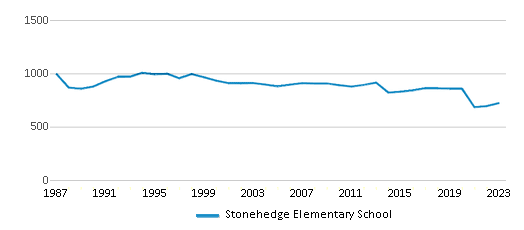
Gender %
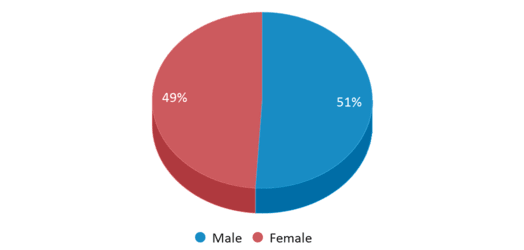
Total Classroom Teachers
20 teachers
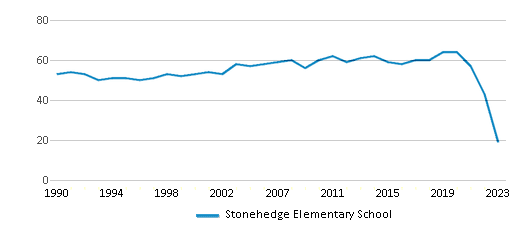
Students by Grade
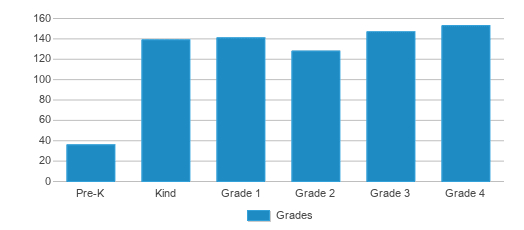
School Rankings
Stonehedge Elementary School ranks within the top 50% of all 4,377 schools in New York (based off of combined math and reading proficiency testing data).
The diversity score of Stonehedge Elementary School is 0.32, which is less than the diversity score at state average of 0.72. The school's diversity has stayed relatively flat over five school years.
Overall Testing Rank
#2046 out of 4377 schools
(Top 50%)
(Top 50%)
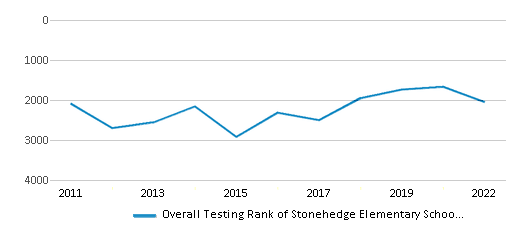
Math Test Scores (% Proficient)
55%
46%
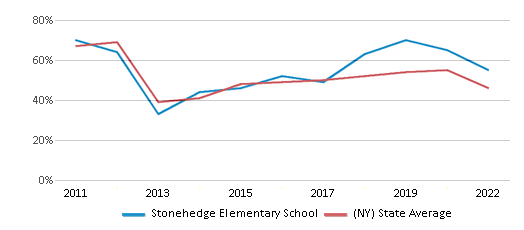
Reading/Language Arts Test Scores (% Proficient)
43%
49%
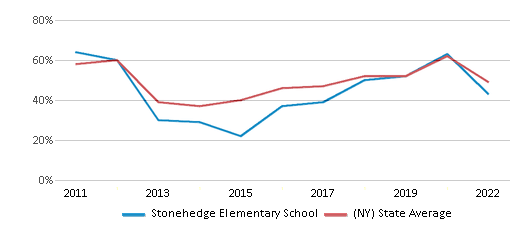
Science Test Scores (% Proficient)
90-94%
78%
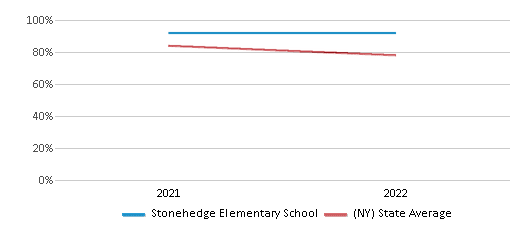
Student : Teacher Ratio
37:1
11:1
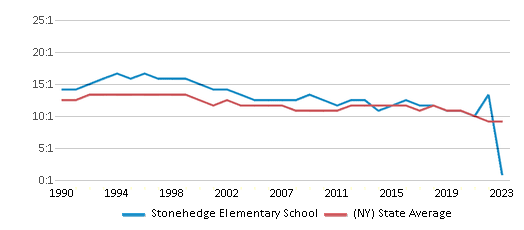
American Indian
n/a
1%
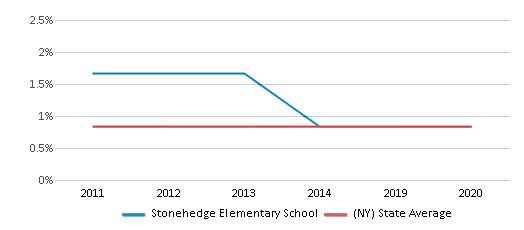
Asian
2%
10%
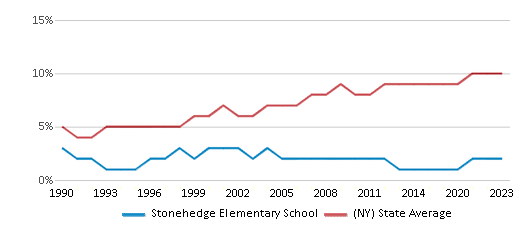
Hispanic
5%
30%
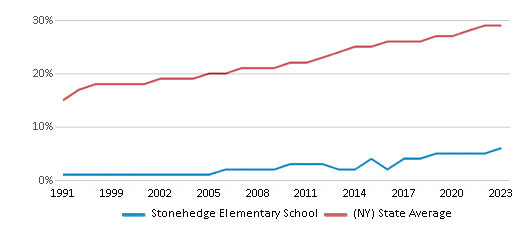
Black
4%
16%
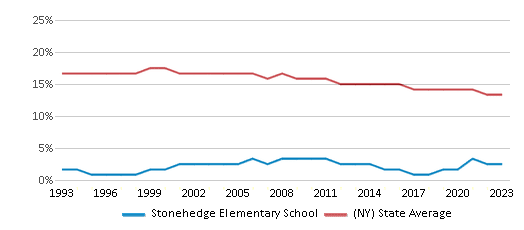
White
82%
40%
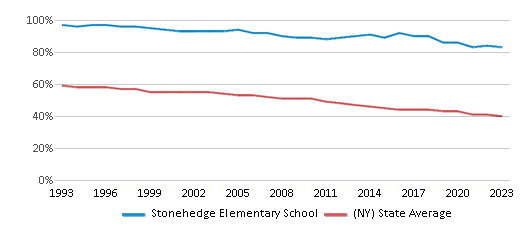
Hawaiian
n/a
n/a
Two or more races
7%
3%
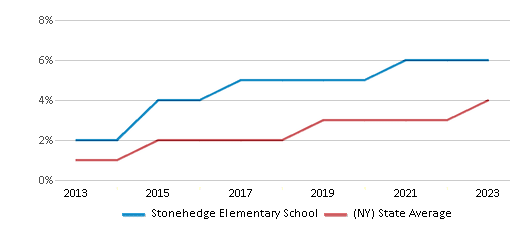
All Ethnic Groups
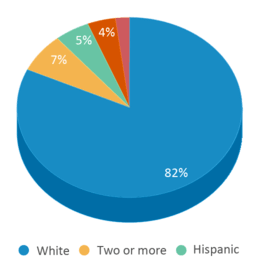
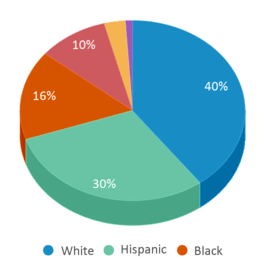
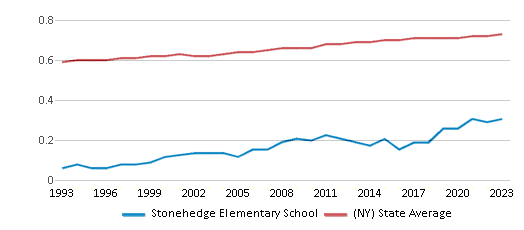
Eligible for Free Lunch
27%
54%
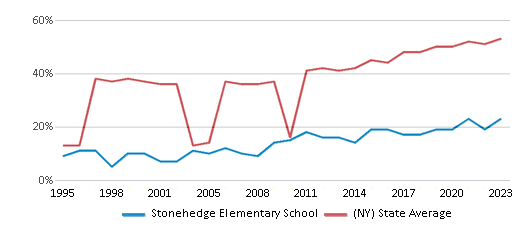
Eligible for Reduced Lunch
3%
3%
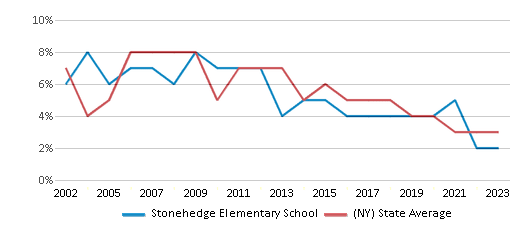
School Statewide Testing
School District Name
Source: National Center for Education Statistics (NCES), NY Dept. of Education
Profile last updated: 02/09/2025
Frequently Asked Questions
What is Stonehedge Elementary School's ranking?
Stonehedge Elementary School is ranked #2046 out of 4,377 schools, which ranks it among the top 50% of public schools in New York.
What schools are Stonehedge Elementary School often compared to?
Stonehedge Elementary Schoolis often viewed alongside schools like Split Rock Elementary School by visitors of our site.
What percent of students have achieved state testing proficiency in math and reading?
55% of students have achieved math proficiency (compared to the 46% NY state average), while 43% of students have achieved reading proficiency (compared to the 49% NY state average).
How many students attend Stonehedge Elementary School?
744 students attend Stonehedge Elementary School.
What is the racial composition of the student body?
82% of Stonehedge Elementary School students are White, 7% of students are Two or more races, 5% of students are Hispanic, 4% of students are Black, and 2% of students are Asian.
What is the student:teacher ratio of Stonehedge Elementary School?
Stonehedge Elementary School has a student ration of 37:1, which is higher than the New York state average of 11:1.
What grades does Stonehedge Elementary School offer ?
Stonehedge Elementary School offers enrollment in grades Prekindergarten-4 (offers virtual instruction).
What school district is Stonehedge Elementary School part of?
Stonehedge Elementary School is part of West Genesee Central School District.
School Reviews
5 6/16/2008
I am a parent of two students at Stonehedge elementary School, one going into fourth grade and one going into second grade. Two things that I think illustrate the type of academics at Stonehege. My first grader was having some difficulty with reading. I have always tried to do a bedtime story with the kids and really did not notice a problem with the way he read. His teacher started him on a reading intensive program with us involved. He would bring from one to five books home a couple of times a week and would read to us. We would write down our feedback as to how he did. In school he would go to a reading class everyday to work with a teacher in a small group setting. Now it is the end of the school year and he is reading fluently and at his age level. My third grader scored high on the SAT tests and was placed in a special class two days a week for advanced students. They met 2 days a week in a small group setting and worked on special projects together. They are just completing a model rollercoaster that will be displayed later this month. There are flaws - no all day kindergarten being one of my pet peeves but parents are involved and the teacher take the time to know your child.
Review Stonehedge Elementary School. Reviews should be a few sentences in length. Please include any comments on:
- Quality of academic programs, teachers, and facilities
- Availability of music, art, sports and other extracurricular activities
Recent Articles

What Is A Charter School?
Explore the world of charter schools in this comprehensive guide. Learn about their history, how they operate, and the pros and cons of this educational innovation. Discover key facts about charter schools, including admission policies, demographics, and funding, as well as what to look for when considering a charter school for your child.

10 Reasons Why High School Sports Benefit Students
Discover the 10 compelling reasons why high school sports are beneficial for students. This comprehensive article explores how athletics enhance academic performance, foster personal growth, and develop crucial life skills. From improved fitness and time management to leadership development and community representation, learn why participating in high school sports can be a game-changer for students' overall success and well-being.

February 05, 2025
Understanding the U.S. Department of Education: Structure, Impact, and EvolutionWe explore how the Department of Education shapes American education, from its cabinet-level leadership to its impact on millions of students, written for general audiences seeking clarity on this vital institution.





